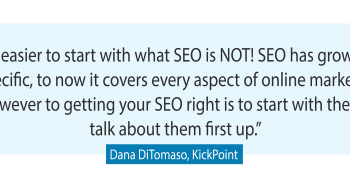
Even more of the best SEO tips for small business from Dana DiTomaso, one of the world’s leading SEO experts
- On December 5, 2018
- 439, Best SEO tips for small business, google, marketing podcast, Marketing tips, seo, seo for small business owners, Small Business Big Marketing, tim reid
Clearly, SEO is a hot topic amongst small business owners.
Reviews of last week’s episode on SEO included: “Your best yet, Timbo!” And “The most practical marketing podcast I’ve ever listened to!” Well, strap in, because Dana DiTomaso (one of the world’s leading SEO experts) continues to answer your most pressing SEO questions to set you up for a profitable year ahead.
Dana is President & Partner at Kick Point, where she applies marketing into strategies to grow clients’ businesses, in particular, to ensure that digital and traditional play well together. With her deep experience in digital, Dana can separate real solutions from wastes of time (and budget).

Now, if you haven’t listened to last week’s episode 438 on SEO, then I suggest you do that first, as Dana overviews the fundamentals of SEO that every website must get right. PLUS she also answers around 15 SEO questions that were sent in to me by you.
In part 2, the questions and answer keep coming as we cover:
- How the little guys can compete against the big brands when it comes to SEO
- Which SEO play will give you the biggest impact upfront
- Voice search and SEO
- The importance of content
- How to get found locally
- And plenty more
So, thanks again for your questions which have formed the basis of this and last week’s episodes.
Your SEO questions that Dana DiTomaso answers in Part 1 of this two-part SEO series are:
Laurel Guymer of LaPerouse Guesthouse:
How do we, a small accommodation business, compete with airbnb, booking.com, wotif.com etc ?
Adam Neilands of Kelapa Organics:
With the goal posts constantly changing with Google’s algorithm, where do we start?
Out of all the tasks we can complete for SEO which one is the most important/impactful for a stronger ranking on Google?
Cameron Harris of Tank On Cleaning:
Should the SEO on each page of my website be the same, or should it be different?
Robert Wheeler of the Rapid Recovery Room:
I’m paranoid about voice search, like Siri, Google Assistant, and Alexa. Apparently, everyone is voice searching on their phones these days and I’m not sure about the best way to get and keep myself in that game.
Scott Pendlebury of the Renovator Store:
I often wonder why most eCommerce companies write their content and then hire an “SEO specialist” to rewrite it. Given SEO is really about having relevant, amazing and engaging content for the user my question is why isn’t it better to make SEO the core strategy of an eCommerce company’s content team?
Shane Scrutton of Eaglemont Tennis Club:
How effective is Google My Business for SEO – ie. does it increase your organic ranking?
Sandy Taylor of Sandy Taylor Digital Marketing:
As an SEO Copywriter who works with small businesses who are new to marketing, my #1 question would be whether Google will develop Google My Business into a workable substitute for a website for sole traders and optimistic hobbyists who aren’t ready for a full website yet?
Robert Cagalj of Lease Communications:
If I pay for Google Adwords would that increase my “Google juice” after my ad has expired?
Enamul Hasan:
How much of an impact does content marketing play when doing local SEO for small businesses? Is it really worthwhile pitching content marketing to local businesses like tradies, small retail shops or service professionals in a local area to help them rank well?
Jim Knott:
Can a business perform well from an SEO perspective purely from organic strategies?
Joern Stienz:
I run a small Design Training agency and my biggest problem is to find the time and energy to create content (eg. write blog articles). Hence, I ordered a few 1,000-word articles from a text broker portal, but they have not improved my website’s visibility. Any ideas on how to make this work?
Steve Witt of Not Just Travel:
If I have 400 local agents all across the UK … how does each agent get found at a local level?
Charlie Morton:
How do I choose keywords? And what constitutes a long-tail keyword?
Leanne Parish:
What’s the best way to get a website to rank for different geotags? For example, you might have a business based in Tamworth, but they might want to rank in Armidale and Coffs Harbour. How do you get them to rank for areas surrounding Tamworth without adding separate pages? We often get clients who want only 5-page websites, so getting them to rank for a far-reaching service area is proving difficult. Help!
Matt from Stargazing UK:
Regarding the layout of a website nowadays … Should you have all of your products on the main page so the URL is as short as possible; or should you categorise them and have them two or three pages down the tree?
Adam Lawrence from Imperium Consulting:
If you were to recommend a small business owner to invest time into the learning of, and money into the purchase of, one all-encompassing SEO management solution, which would it be, and why?
Me:
What would your SEO strategy be to maximise the number of SMEs who hear this episode?
Here’s what caught my attention from my chat with Dana DiTomaso:
- Get your SEO fundamentals right … Title tags, load time, mobile-friendly, update your website at least monthly.
- Complete your Google My Business account … and be sure to post on a regular basis.
- Create helpful content that solves the problems of your precious customers.
Click Here To Download Full Transcription
Resources mentioned:
- KickPoint’s official website
- Sign up for KickPoint’s newsletter
- Hemingway Copy Editor
- Moz
- SEM Rush
- Google My Business
Please support American Express who make this show possible:
American Express Business Explorer Credit Card
Let your business expenses reward you. Every year.
If something in this episode of Australia’s favourite marketing podcast peaked your interest, then let me know by leaving a comment below.
May your marketing be the best marketing.


